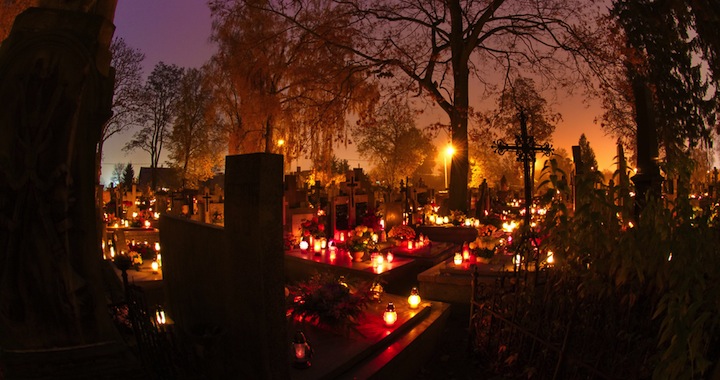Consider death: The post-final frontier.
Death surrounds all of us in the Northern Hemisphere this time of year. Life is sucked out of the trees, one chlorophyll molecule at a time, lifting the green and vibrant ball gowns from the complex petticoats worn by each leaf. The air chills bumble bees to a dazed stasis on the season’s final, sweet figs.
The dark rises. Costumed demons and zombies walk the streets in search of sugary fire. Our Latino friends embrace recollections of the dead with the paradoxically joyful “Day of the Dead, ” which is actually three days in Mexican celebration, Halloween through All Saints and All Souls Day, that three-day triduum of cleaning and decorating graves, of prayers for the dead, of memories of loved ones who have passed away. The Hindu Diwali comes this time of year, when Hindus light the spoon-sized diyas to celebrate their belief that Good can overcome Evil, that gods can defeat the demons, that even a tiny candle is mighty enough to push back the shadows.
For traditional Christians, Nov. 1 is All-Saints Day, the day to honor the righteous humans believed to be now living in the throne room of God. Nov. 2 is for All Souls who have died, a day to pray for anyone who is gone – and especially for those whose sketchy life choices put in question whether they have made it to the throne room.
Related: Looking for Someone to Bomb – by Carl Medearis
Silliness, atheists might say. Superstition. It’s a fact we all die. Get over it, and make the most, with joy and love, of the life you have been given.
They’re all correct, you know.
For me, in particular, the last few months have been a meditation on death. I’ve been charged, every week, with writing a “Life Story” about someone who has died. Write one of those, and you’ll consider what is worth telling about your own life. Write several, and you will consider what trace, what legend your own life might be leaving behind.
What is left, in a month, a year, a dozen years, a hundred years after our deaths?
Not much, that’s for certain. Some anecdotes. Some mass of material items suddenly not worth much. But, most enduringly? Only the residue of love – or the rust of hatred. Most everlastingly, only those two things remain, for all our efforts.
Meditating on Death is one of the central disciplines of Buddhism, the Dalai Lama teaches. About the existence of God, the Dalai Lama isn’t so sure. But he is sure about the connection – the indissoluble connection – among human beings themselves, whatever the superficial differences, and also about the oneness between human beings and the stuff of stars. That’s worth, well, meditating upon, of being quiet in the same way one falls silent at the brink of the Grand Canyon, a silence outlined by a breathed-out “Wow.”
Here we are. We things of dust and dirt, we negligible creatures of selfishness and lust, shortsightedness and laziness – we drunken children at the controls of a fully loaded jet capable of crashing into all we hold dear and bringing it to naught – we ourselves are nothing. But we also are everything. We are individual, but we are also herd. We are doomed; we are eternal. As Jesus reminded us: We walking corpses carry the kingdom of Heaven inside our hearts of clay.
Also by Kay: 8 Things I Know For Sure About Prayer
That is maybe one of the silent messages of the rickety, fading roadside memorials, those friable attempts to grasp the here-ness of lives vaporized too soon in the flash of a bad decision, a slick road, a careless glance.
Finally, then, it’s just us and the darkness. Me and nothing-all.
Let us hear the reminder this season brings of our own fragility as a call to leave behind a length of the chain of love, service and strength that has undergird the brightest times of our own lives. Let us drop along the roadside of our days the memory of a helping hand, a smiling face, a courageous heart. Let us construct enduring shrines, even along forgotten and hidden tracks, of actions that will build a better highway for those who follow.
And then, and perhaps only then, can we go, gently, into that good night.

